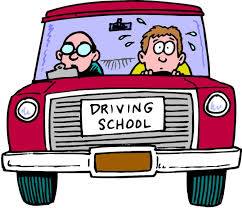 Today, July 14, my son Trevor (with regressive autism) turns sixteen. When I turned sixteen, I had been taking driver’s education classes in high school already and was looking forward to getting my driver’s license. My dad had already bought me my first car (a beater Ford Maverick that I lovingly nicknamed “The Woobie,” WBB — White and Blue Bitch) and was doing lots of work on it to get it ready for me. It is a rite of passage for most teens. You turn sixteen, you can legally drive a car. You are then able to drive yourself and your friends and siblings to and from school (or, in my case, gymnastics practice) and not have to take the bus or have your mom pick you up. You can have a social life and have some independence and freedom. Every teen counts down the days to this momentous occasion.
Today, July 14, my son Trevor (with regressive autism) turns sixteen. When I turned sixteen, I had been taking driver’s education classes in high school already and was looking forward to getting my driver’s license. My dad had already bought me my first car (a beater Ford Maverick that I lovingly nicknamed “The Woobie,” WBB — White and Blue Bitch) and was doing lots of work on it to get it ready for me. It is a rite of passage for most teens. You turn sixteen, you can legally drive a car. You are then able to drive yourself and your friends and siblings to and from school (or, in my case, gymnastics practice) and not have to take the bus or have your mom pick you up. You can have a social life and have some independence and freedom. Every teen counts down the days to this momentous occasion.
 With my son’s upcoming “Sweet Sixteen” birthday approaching, it dawned on me that he will probably never get a driver’s license. Adding salt to the wound of this realization was the announcement that my nephew, a year younger than my son, is taking driver’s ed this coming school year and is going to be a freshman in high school. Ouch. Then more salt was sprinkled into the wound with many of my friends proudly proclaiming on Facebook that their typical children, who are my son’s age now, have their driver’s licenses, and warning everyone in the vicinity to “keep off the road.”
With my son’s upcoming “Sweet Sixteen” birthday approaching, it dawned on me that he will probably never get a driver’s license. Adding salt to the wound of this realization was the announcement that my nephew, a year younger than my son, is taking driver’s ed this coming school year and is going to be a freshman in high school. Ouch. Then more salt was sprinkled into the wound with many of my friends proudly proclaiming on Facebook that their typical children, who are my son’s age now, have their driver’s licenses, and warning everyone in the vicinity to “keep off the road.”
This got me thinking . . . What is going to happen to all of our “autistic” children who will most likely never be able to drive? How will they be independent, drive to the store, school, or hold a job if they can’t drive? Do their parents or siblings have to not work in order to drive them everywhere when they get older and age out of services? There are no services like this that I have heard of. Can you imagine them using public transportation unassisted? I sure can’t.
 What about the high-functioning or recovered kids who might be able to take the written test with assistance, and possibly be able to pass the road test? I failed my road test twice, mind you, out of pure inexperience and nervousness. My old neighbor and friend borrowed my mom’s car for her road test, and got into an accident in the DMV parking lot even before she took the test. Good times! We were typical kids in the 1980s. Back then, we weren’t harmed by dozens of vaccines, GMOs, or all of the other horrendous toxicities that have been forced upon our kids. What is going to happen when those one in six kids who currently have developmental disabilities try to get a driver’s licenses? (Or their parents think it’s a great idea.) Keep off the road indeed!
What about the high-functioning or recovered kids who might be able to take the written test with assistance, and possibly be able to pass the road test? I failed my road test twice, mind you, out of pure inexperience and nervousness. My old neighbor and friend borrowed my mom’s car for her road test, and got into an accident in the DMV parking lot even before she took the test. Good times! We were typical kids in the 1980s. Back then, we weren’t harmed by dozens of vaccines, GMOs, or all of the other horrendous toxicities that have been forced upon our kids. What is going to happen when those one in six kids who currently have developmental disabilities try to get a driver’s licenses? (Or their parents think it’s a great idea.) Keep off the road indeed!
Recently, another friend of mine shared with me that her ex-husband has a seizure disorder which is not “on the record,” so he can still drive her kids around (one with autism), and has actually had a seizure while driving with them in the car. The older child had to become the adult in the situation. I can’t imagine . . . They share custody, and a judge allows him to drive with her children in the car, despite her concerns. How many of our kids have had seizures that aren’t “on the record?” Some kids with autism don’t start having seizures until puberty sets in, in their teens.
I started searching for resources and information on the subject. Many interesting things that I had not had to think about before came up in my search. In March, 2013, the U.S. Census Bureau released data showing that between 2008 and 2010, individuals without disabilities were about three times more likely to be employed than Americans with disabilities. In addition, there is a 75 percent earnings gap between workers with disabilities and their peers. Only 46 percent of workers with a disability worked full-time, compared to 62 percent of those without a disability. A half a million children with autism are expected to age out of educational and other support services after they turn 21 within the next 10 years.
 I wondered: How did all of these working people with disabilities in this study get to work? Did they drive? How the hell did they get a driver’s license? If they made so little money, wouldn’t they better off collecting SSI or SSDI and living at home, and having a family member with higher earning potential go to work instead? But then, who would supervise them at home? Are our kids are going to be competing with our elderly parents, the baby boomers, for Social Security money? Is my generation going to be taking care of our parents and our kids? Will we become full-time caregivers and drivers for both generations? It’s already happening. Who will be working to pay the bills with the divorce rate so high among parents of kids with autism? Will we all be forced into the Free Shit Army? Nothing to see here, move along!
I wondered: How did all of these working people with disabilities in this study get to work? Did they drive? How the hell did they get a driver’s license? If they made so little money, wouldn’t they better off collecting SSI or SSDI and living at home, and having a family member with higher earning potential go to work instead? But then, who would supervise them at home? Are our kids are going to be competing with our elderly parents, the baby boomers, for Social Security money? Is my generation going to be taking care of our parents and our kids? Will we become full-time caregivers and drivers for both generations? It’s already happening. Who will be working to pay the bills with the divorce rate so high among parents of kids with autism? Will we all be forced into the Free Shit Army? Nothing to see here, move along!
Another study by Drexel University, the first of its kind, appears in Journal of Autism and Developmental Disorders. Researchers had 78 adult drivers with ASD complete a questionnaire used in driving research to explore real-life driving experiences, and compared them to 94 drivers without ASD. Participants ranged in age from 18-60, average age 34. They found that adults with ASD earn their driver’s licenses at later ages, drive less frequently and put more restrictions on their driving. These self-imposed restrictions include not driving on highways, or at night. Adult drivers with ASD also reported more traffic violations than the comparison group.
Thanks Captain Obvious, but these people in the survey are not kids like my son (or younger), who are in the first wave of vaccine-induced “regressive autism” who will most likely never drive. Not the same ASD! But wait, if they acknowledged that, it would mean that the powers that be would have to admit that our kids are not just quirky or wired differently, but that they actually suffered from brain damage after birth. We can’t have that, can we? Therefore, transportation services are going to be yet another thing that is going to have to be provided for our kids in the very near future, as our children grow up and age out of the system. And since nothing is changing to prevent what is actually preventable, these statistics are going to get worse.
 My son doesn’t even look both ways before crossing the street without a reminder from another person. He has sensory processing issues that would affect him behind the wheel with all of the competing sights and sounds. He would not be able to anticipate another driver’s behavior and respond appropriately. Motor planning and reaction time are issues. He also has periodic anxiety, meltdowns, anger, stimming and OCD behaviors. You can’t do those things when you’re driving a car. Other people’s lives are at stake. He can’t even manipulate the Wii remote in a simulated driving game. We are working on it, but he usually ends up hitting the wall, or driving off a bridge during a Wii game. Yeah, he won’t be driving a car anytime soon.
My son doesn’t even look both ways before crossing the street without a reminder from another person. He has sensory processing issues that would affect him behind the wheel with all of the competing sights and sounds. He would not be able to anticipate another driver’s behavior and respond appropriately. Motor planning and reaction time are issues. He also has periodic anxiety, meltdowns, anger, stimming and OCD behaviors. You can’t do those things when you’re driving a car. Other people’s lives are at stake. He can’t even manipulate the Wii remote in a simulated driving game. We are working on it, but he usually ends up hitting the wall, or driving off a bridge during a Wii game. Yeah, he won’t be driving a car anytime soon.
This realization was actually pretty heartbreaking to me and caused a lot of introspection. As parents, we all have our own ideas about what our kids “should” be doing. When a monumental birthday is creeping up on us, it puts a magnifying glass on the issue. Each birthday is another reminder of my perceived failure to recover him. One night, I was talking to my younger son, Damon, who is 12 going on 30, and I couldn’t stop my tears from flowing (the ugly cry) as I shared my feelings on the subject with him. I was lamenting about how Trevor will never be able to drive, pick up his girlfriend to go to prom, drive to the movies, the mall, or parties with his friends, and how I blamed myself for all of these things that he wouldn’t be doing at 16 that I did. (All the first car money has been spent on therapies anyway. Plus, can you imagine the insurance premium?)
My sage little Yoda stopped my tears in their tracks when he stated “Mom, what happened to Trevor is not your fault. You didn’t know. Besides, who cares if Trevor doesn’t drive a car, or hang out with some chick? That’s not his mission.” Whoa! I taught him well. I sniffed back my tears and said, “You know, you’re right! I guess I still haven’t forgiven myself yet.” Damon continued to comfort me with his reassuring words and his promise to help take care of his brother. “We are family; we take care of each other.” I have struggled for years with cyclical depression (over numerous things) and self-blame, and birthdays are always a trigger for me, this one more than most.
 I know all too well what bad decision-making and impaired driving can lead to. I was widowed when I was 27 years old. My first husband was killed in a car accident with his best friend driving his vehicle. They were out celebrating another friend’s divorce, and my husband, who was sober, gave his impaired friend (who was drinking and using drugs), his keys and told him he was driving them home. My husband’s friend fell asleep behind the wheel, and my husband tried to wake him and grabbed the steering wheel. His friend woke up, overcorrected the steering wheel, and flipped the vehicle off the road. My husband wasn’t wearing a seat belt and died at the scene from head trauma. His friend walked away. I lived through hell, and his friend still is nearly 20 years later. He was driving impaired, under the influence, and he killed his best friend.
I know all too well what bad decision-making and impaired driving can lead to. I was widowed when I was 27 years old. My first husband was killed in a car accident with his best friend driving his vehicle. They were out celebrating another friend’s divorce, and my husband, who was sober, gave his impaired friend (who was drinking and using drugs), his keys and told him he was driving them home. My husband’s friend fell asleep behind the wheel, and my husband tried to wake him and grabbed the steering wheel. His friend woke up, overcorrected the steering wheel, and flipped the vehicle off the road. My husband wasn’t wearing a seat belt and died at the scene from head trauma. His friend walked away. I lived through hell, and his friend still is nearly 20 years later. He was driving impaired, under the influence, and he killed his best friend.
After living through this nightmare, I truly had to ask myself, “Why would I intentionally put my son with known neurological impairments behind the wheel of a car?” A car can be weapon. Impaired driving of any kind can have a lifetime of implications, devastating families. According to MADD (Mothers Against Drunk Driving), drunk driving costs the U.S $132 billion a year. CDC statistics report that nearly one-third of all crash deaths involve an alcohol-impaired driver and that, every day, almost 30 people in the U.S. die in motor vehicle crashes that involve an alcohol-impaired driver.
Speaking of impaired driving, in addition to all of the drunk drivers, it’s pretty frightening to think of all of the people behind the wheel who are on numerous prescription medications. And let’s not forget all the people who use illegal drugs and decide it’s okay to drive. Medical News Today reported that in 2011 doctors wrote 4.02 billion prescriptions for drugs in America. That is roughly 13 prescriptions for every man, woman and child in America, not counting vaccines! My family is collectively on zero prescription medications. The way that doctors now prescribe psychotropic drugs for ADD, ADHD, and every other “disease,” combined with the aforementioned impaired drivers, Oracle predicts that there are going to be a lot more traffic accidents and fatalities in the near future.
 So, after considering all of these factors, I realized that I had to let go of my ideas of what my son “should be” doing at sixteen, and celebrate all that he is doing. He’s come so far in his journey and I couldn’t be more proud of him. I saw that I needed to revisit my spiritual teachings such as “When you change the way you look at things, the things you look at change.” I also needed to forgive myself. After a few years of anger, I was able to forgive my husband’s friend for something that most people would consider unforgivable, so why could I not forgive myself for something that was not my fault?
So, after considering all of these factors, I realized that I had to let go of my ideas of what my son “should be” doing at sixteen, and celebrate all that he is doing. He’s come so far in his journey and I couldn’t be more proud of him. I saw that I needed to revisit my spiritual teachings such as “When you change the way you look at things, the things you look at change.” I also needed to forgive myself. After a few years of anger, I was able to forgive my husband’s friend for something that most people would consider unforgivable, so why could I not forgive myself for something that was not my fault?
Hopefully this will be the last year I throw myself a pity party and just throw him a birthday party. (With gluten-free, non-GMO cake of course). He starts a round of 20 sessions of HBOT today. Great birthday, I know. The greatest gift I can give him, birthday or not, is to help him heal and improve as much as possible. Even if he never gets to drive a car, an activity which is overrated, I’ll be honored to be his chauffeur.
Happy Sweet Sixteen, my sweet boy!
My favorite band when I was 16 was Duran Duran. Please enjoy “The Chauffeur” in a more modern live version:
XO,
~ Oracle
Oracle (Laura Hirsch) – has a B.A. in Speech Communications and is the author of three books. She is also a contributing author/editor/publisher of the Team TMR book Evolution of a Revolution: From Hope to Healing. Her first book was an autobiography about her experience of being a young widow, which led to her investigation of mediumship as a therapeutic avenue for grief. She remarried and had two sons, the older one diagnosed at age three with regressive autism. Her love and devotion to her son led her back to mediumship for answers from her loved ones in spirit and others on how to heal her son. Working with a psychic medium and his wife, a spirit artist, they extended an open invitation to the spirit world to help solve the autism puzzle. Her third book, The Other Side of Autism: Famous Spirits Unveil Regressive Autism’s Causes and Remedies is the culmination of their sessions. She is also a non-GMO advocate and is featured in the documentary Genetic Roulette in the autism segment. Her website is The Other Side of Autism.

















I am so touched by all of your comments, thank you so much. I’m in tears. I have been totally overwhelmed by HBOT and back to school drama that I have not checked out the comments. It truly means the world to me. xoxo, Oracle
Thank you for sharing this, i relate with you i am an educator in the children’s ministry in my local church i teach a group of 3 to 8 yr old and my son is 6 with ASD, i shade tears quite often after church sometimes i feel um torturing myself being part of the children’s ministry other times um strong and smiling and convince my self that everything will be okay .
Thank you Laura. For your infinite wisdom. You are a tireless warrior fighting the fight every day.
Thank you for sharing a very personal part if your world.
I have witnessed your amazing efforts with Trevor. I have seen him make some amazing progress……
And where there is still a long journey ahead ….You are teaching us all along the way. . Thank you …..
Happy Birthday Trevor. And way to be the rock Damon. ……
Loved your article! I can relate .I have a niece and nephew my ASD son’s age.I am constantly reminded of what my son is missing out on. I too have become very spirtual and I realize what my son’s journey has given me : ) I still feel sad at times but get over it easier these days. He has had 2 regressions. He has lived through so much. He is getting better and i continue to work along side him in his journey.He is MY teacher no mistake about that : ) and I am his chauffeur for now lol God Bless!!!
I was just riding a NYC subway train as I read this & shamelessly began to weep as I read the words of your very wise 12 year old son. I’m weeping again just recalling them. You touched on so many of my own thoughts & feelings in this post. And your young son has left me with a lump in my throat that will probably be there all day. Thank you for sharing all of this. Thank you!